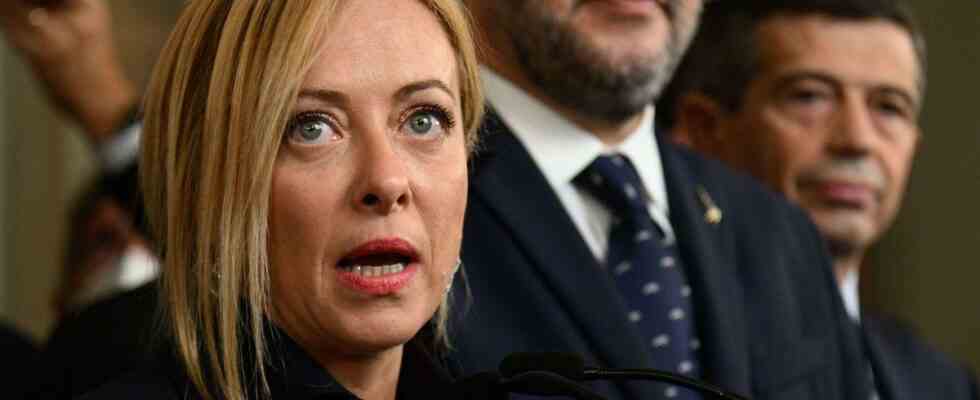Who will be the new faces of the Italian government? Giorgia Meloni, leader of the post-fascist party Fratelli d’Italia, winner of the legislative elections, has been asked to form a government by President Sergio Mattarella, announced the secretary general of the presidency.
Giorgia Meloni, 45, has accepted this responsibility, becoming the first woman called to this function in the country’s history. She will present the composition of her government on Friday afternoon, which will take the oath on Saturday morning at 8 a.m. in the Quirinal Palace before the President of the Republic Sergio Mattarella.
Who are the key figures in power?
Giancarlo Giorgetti, Minister of Economic Development under Mario Draghi, will be the Minister of Economy in the new Italian government, the new Prime Minister announced on Friday. At 55, he passes for a powerful but discreet figure in the League (extreme right) of Matteo Salvini, of which he is considered one of the most moderate and pro-European representatives.
Matteo Salvini, head of the Anti-Immigration League, returns to the post of Deputy Prime Minister which he had already occupied after the 2018 elections, when his party had formed a government with the populist ecologists of the 5 Star Movement. He also inherited the Ministry of Infrastructure, which notably has the upper hand over the country’s ports. A key position, therefore, for Matteo Salvini who, inside, had blocked several NGO ships rescuing migrants in the Mediterranean under the League’s “closed ports” policy. He is still being prosecuted in this capacity before a Sicilian court for kidnapping and abuse of power.
President of the European Parliament between 2017 and 2019, Antonio Tajani may seem like a surprising choice in this government with a strongly Eurosceptic color. But he is close to former Prime Minister Silvio Berlusconi, leader of the right-wing Forza Italia party, a minority partner in Meloni’s coalition which won 8% of the vote in the elections. Like Salvini, Tajani is also appointed Deputy Prime Minister.
Salvini dismissed, he is a technocrat who takes the portfolio of the Interior in a nationalist government for which security and immigration issues are strategic. Matteo Piantedosi, 59, has spent his entire career in the prefectural and senior civil service, largely in the Interior Ministry, where he was Matteo Salvini’s chief of staff. Since August 2020, he was prefect of Rome.
A series of challenges
At a particularly difficult time in the eurozone’s third-largest economy, the far-right leader will face several challenges. First, inflation, which increased by 8.9% over one year in September. Giorgia Meloni will also have to tackle the budget of a country long undermined by weak growth and productivity. She pledged not to blow it up to reassure investors. Italy has a colossal debt of more than 2.7 trillion euros, or about 150% of its gross domestic product (GDP), the highest ratio in the euro zone after Greece.
Italy was particularly affected by the energy crisis due to its dependence on gas imports. Before the war in Ukraine, Italy imported 95% of the gas it consumed, of which around 40% came from Russia. This figure has fallen to around 10% since Mario Draghi signed contracts increasing the volume of gas from other producers, while accelerating the transition to renewable energies.
The party, presidential, post-fascist Fratelli d’Italia, eurosceptic, gave up asking for Italy’s exit from the euro, but Giorgia Meloni promised to defend her country’s interests more in Brussels. Italy’s future growth, however, depends on nearly 200 billion euros in EU grants and loans from its post-pandemic recovery fund. These in turn depend on a series of reforms, ranging from justice to the digitization of public administration, to be implemented by 2026. The Prime Minister’s coalition has promised to review this plan, but she has not yet said how, and as part of the funds have already been paid, Brussels is unlikely to allow major changes.
Support or not for Ukraine
Mario Draghi has been a staunch supporter of Western sanctions against Moscow for invading Ukraine, and NATO member Italy has also sent arms to kyiv. Giorgia Meloni supported this position, even when she was in opposition, and together with her allies promised to continue supporting Ukraine, which is likely to become more complicated.
Matteo Salvini regularly criticizes the sanctions against Russia, which he considers ineffective and counterproductive, while Silvio Berlusconi, whose Forza Italia party is also in Giorgia Meloni’s coalition, has had personal relations with Putin for years and that he claims to have recently “knotted” again.

